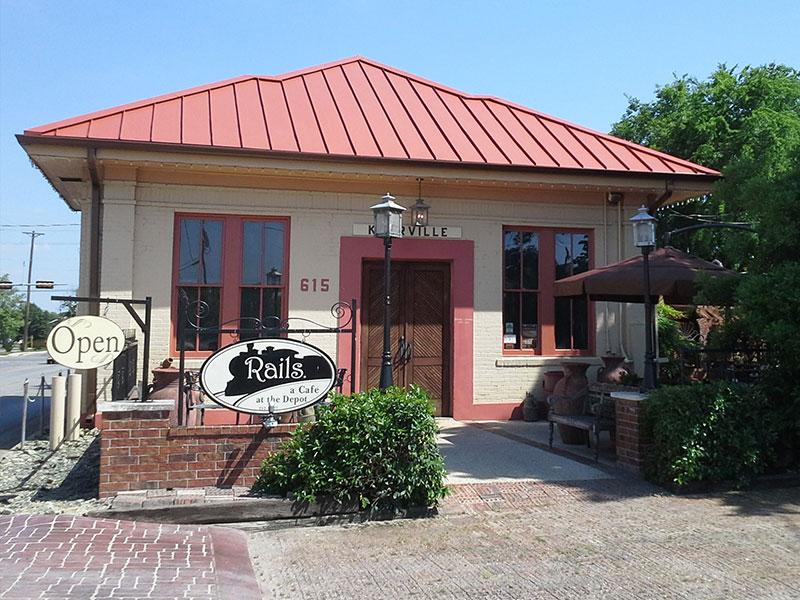San Antonio & Aransas Pass Train Depot
In the past, several depot buildings existed in Kerrville. Because the previous wooden depot burned down in 1913, the one here now was built in 1915. It was unusual at that time for the SA&AP to construct brick depots. General Manager J. S. Peter was quoted in the Kerrville Mountain Sun, Saturday March 20 1915, “The people of Kerrville have been patient and long suffering in the matter of passenger depot facilities, and we are going to build them a depot that will be an ornament and a credit to the town." We believe they did.
No paved streets or electricity existed in San Antonio in 1884. Located between cattle ranches, farmland, and the gulf coast, San Antonio was destined to become a great city. But it needed a direct railway to a deep water port and stockholders elected directors in August of 1884. The San Antonio & Aransas Pass Railway was created without much money. The grand vision of Uriah Lott started when construction began May 18, 1885. The decision to bring the railroad to Kerrville instead of Fredericksburg was a contest hard-fought by the citizens of those towns. The Kerrville committee, headed by Charles Schreiner, was the first to secure $180,000 in subscriptions, right-of-ways, and land. The first train arrived in Kerrville October 6, 1887. A wonderful account of that event can be found in the book Uriah Lott by J. L. Allhands (read more in our section of Uriah Lott).
The SA&AP was a popular line that took people and trade "To the Mountain Resorts" and "The finest health country in America". The rail served as an important piece of the Texas story, bringing prosperity of our area. Kerrville was the last stop on the line with the train turn table at the south-east corner of Paschal and Schreiner streets. Many of the SA&AP depots are gone. We are proud that this one still serves the people of Kerrville.

Uriah Lott
Click to toggle additional content...
Uriah Lott, a man who changed the fortunes of Kerr County
Posted 10/28/2013 on Joe Herring, Jr.'s blog at www.joeherringjr.com. Posted with permission.
Some characters from Kerrville's history have wonderful names, names so unique one would think the names are fictional. To me, one of the names fitting this description is that of Uriah Lott.
In most of the late-1880s newspaper accounts mentioning him, he is simply called "President U. Lott," and while he was never a Kerrville or Kerr County resident, he had a huge impact upon our history.
Lott was born in Albany, New York, in the winter of 1842, and came to Texas after the Civil War, arriving in Brazos Santiago in 1867. He found work in Brownsville at a commission house, and by 1871 chartered three vessels to transport wool and hides to markets in New York.
He worked to improve the channel at Corpus Christi, and served as a director of the Corpus Navigation Company.
For most of his life he was interested in moving goods from point A to point B, and he made his living by capitalizing on the spread between prices at different locations, a kind of simple arbitrage.
Sometime, in the midst of his many trades, he came to realize another way to profit from those price differences: one could also charge for the transportation of products.
And so Uriah Lott got in the railroad business. Uriah Lott eventually built a railroad over 1,000 miles long, and when he started, he had $15 cash.
And though at the end of his life Uriah Lott would again be penniless, dying alone at the Casa Ricardo Hotel in Kingsville, for several decades Uriah Lott decided which communities would prosper, and which would not.
At the beginning, Lott wanted only to build a small, narrow-gauge railroad from Corpus Christi to Laredo, to haul hides, wool, horses, mules, and even copper, lead, and silver from Chihuahua, Mexico to waiting ships in Corpus Christi. Almost all of these products were hauled to Corpus Christi by ox-cart.
An bond election was called to authorize $200,000 in bonds to build the railroad, but the election was cancelled when opposition, primarily from the owners of the ox-carts, grew too strong.
Realizing the banks were not an option, unable to secure public financing, and reluctant to seek capital on Wall Street, Lott visited legendary cattlemen Richard King and Mifflin Kenedy. Lott described to the men the changes the railroad would beckon in south Texas, and both became enthusiastic supporters, and provided the necessary capital to start the railroad.
The line from Laredo to Corpus was officially called the Corpus Christi, San Diego and Rio Grande Narrow Gauge Railroad, but most referred to it as "Lott's Folly," since the project took seven years to complete.
It had a humorous beginning.
In 1875, Lott ordered his first locomotive, from the Baldwin Locomotive Works in Pennsylvania. It arrived in September, aboard the steamship "Mary," and bore the brass legend "Corpus Christi."
On Thanksgiving Day, 1875, a crowd of people gathered at "Cooper's Alley and Mesquite Street" to see Lott drive the first "golden spike" of the new railroad. A February 2012 article in the Corpus Christi Caller reports that the "golden spike," which was actually a regular railroad spike painted to look golden, was stolen that same evening.
The article continues:
"A month after the golden spike was driven and stolen, Lott sold excursion tickets, at 50 cents a ticket, to ride to the end of the track. Passengers sat on wooden benches as they rode 18 miles to Martha Rabb's pasture. By Jan. 1, 1876, 25 miles of track had been laid and the line had one wood-burning locomotive and 14 cars.
"Lott ran out of money and was forced to sell the line to the Palmer-Sullivan Syndicate and the Texas Mexican Railway acquired the project and finished the line," which finally arrived in Laredo in 1881.
But Uriah Lott learned from this first experience. His next big project was big indeed: the San Antonio and Aransas Pass Railroad. And with that new venture, Uriah Lott changed the course of Kerrville's and Kerr County's history.
Until next week, all the best.
Joe Herring Jr. is a Kerrville native who is old enough to remember trains lumbering through Kerrville. This column originally appeared in the Kerrville Daily Times October 26, 2013.
The Kerrville Mountain Sun
Click to toggle additional content...
Vol XXXIII Kerrville, Kerr County, Texas, Saturday, March 20, 1915
Kerrville To Get New Depot
General Manager J.S. Peter of the “Sap” Visits Kerrville and
Assures Business Men of New Building
Work to Begin Soon
Structure will be Modern and Built of Brick. Bids will be Called for at Once
“The people of Kerrville have been patient and long suffering in the matter of passenger depot facilities, and we are now going to build them a depot that will be an ornament and a credit to the town.”
This is what General Manager J.S. Peter said to the board of directors of the Kerrville Business Men’s Club at his private car Monday morning at an informal meeting.
Mr. Peter came up Saturday night, spent the day in Kerrville Sunday, held a meeting with the business men Monday, and afterward went out for a few hours fishing on the river with a party of Kerrville citizens, including Dr. W.P. Dicky, Mayor Geo. Morris, Alderman Ally Beitel, J.E. Grinstead and Mr. Peter’s secretary, Mr. McKensie.
Before leaving on the Monday afternoon train Mr. Peter stated that bids on the building would be asked for at once, and it was his purpose to have the building ready for use by the time the summer tourist travel set in. The building, a cut of which is shown on this page is the same as originally designed about two years ago, the erection of which has been delayed on account of the great losses of the railroad by the heavy floods of last year and the latter part of 1913. The structure is to be brick, and will be modern throughout. When completed it will be one of the handsomest passenger depots in a small town in the state.
The new depot will be located at the site purchased by the railroad company about two years ago, between Clay and Tehoupitoulas streets. Mr. Pete thought it would require about sixty days to complete the work.
Since the old passenger depot was destroyed by fire in the latter part of 1913 Kerrville has practically been without a passenger depot. The people have of course complained of the condition, but they have borne the affliction in a credible manner, and now they are to receive their reward.
Mr. Peter was taken for a drive over the Medina and Center Point roads, and was enthusiastic in his praise of the progress of KerrCounty in the matter of road building. The streets of Kerrville he complimented very highly, and said there was no town the size of Kerrville, in the state, so far as he knew that had such excellent streets.
After the trains stopped running to Kerrville The Depot was used for other things, some of them are listed below
- Jimmy Rogers Jubilee
- Harry Dietert Machine Shop
- Mike & Kathy Walker Restoration (restaurant)
- Choo Choo's Barbecue - "Don't need no teeth to eat our beef!"
- Rails - a cafe at the Depot restaurant 2004
